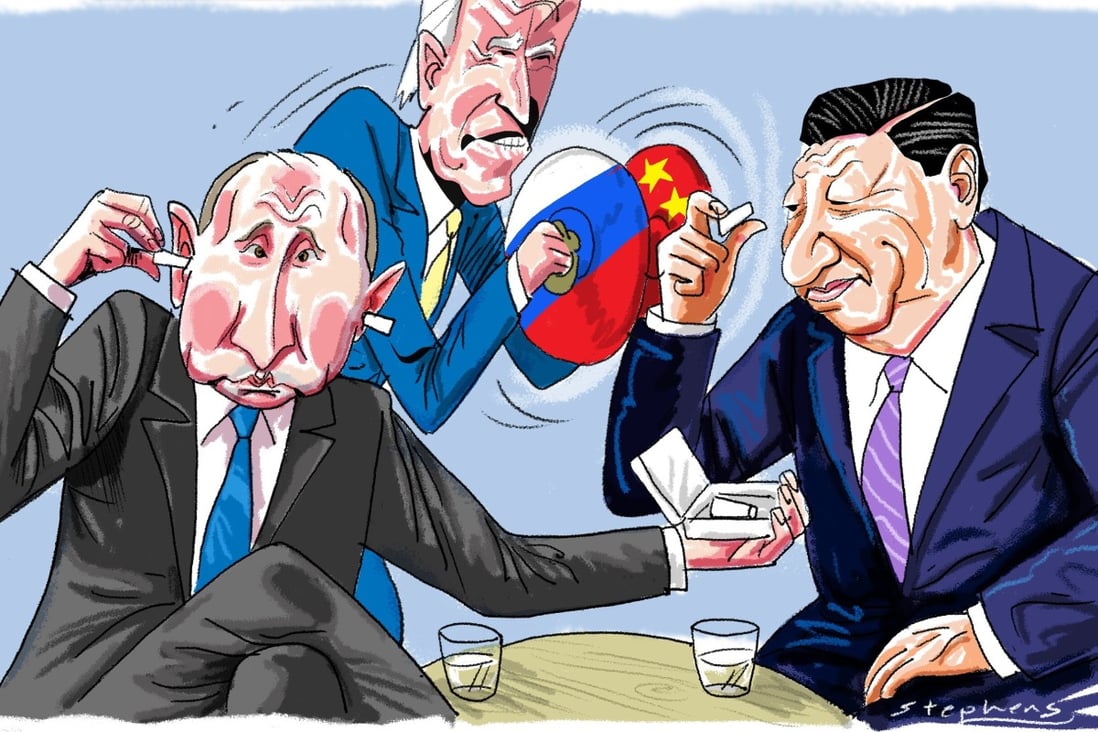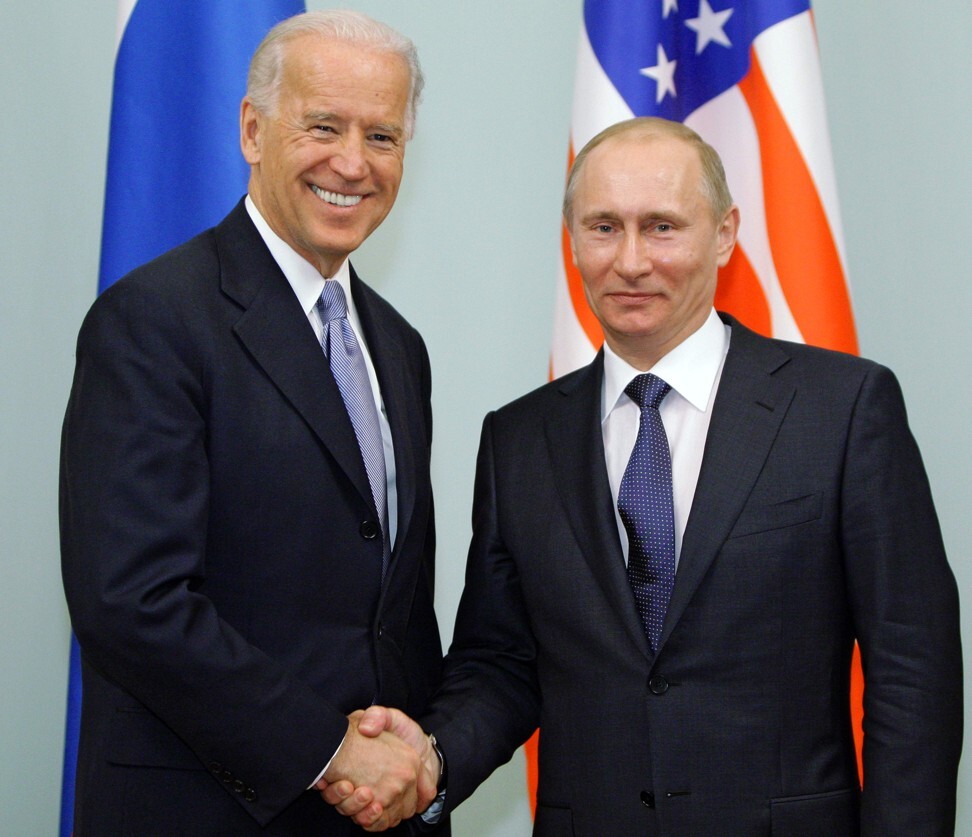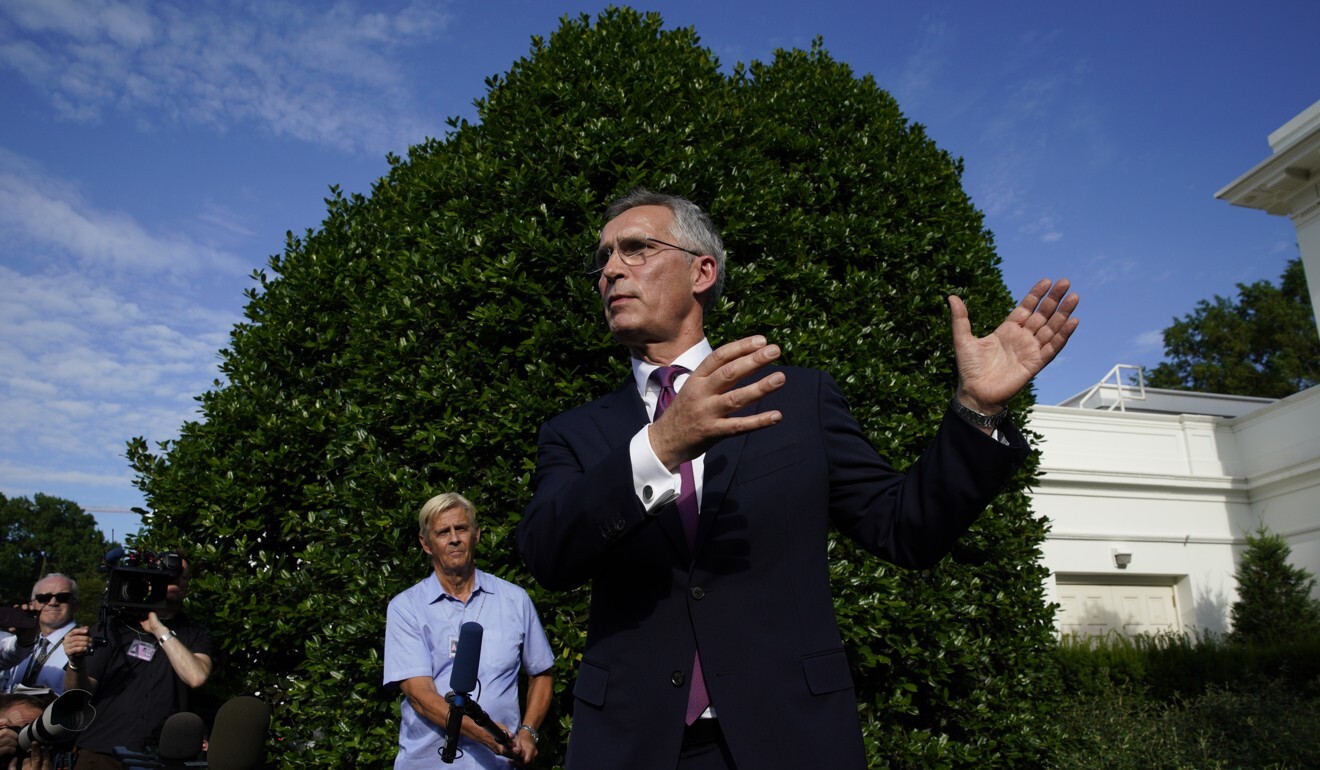How US belligerence is driving China and Russia closer together
- Biden has been proclaiming that his trip to Europe is aimed at promoting an ‘alternative to China’ while confronting the ‘harmful activities’ of Beijing and Moscow
- In response, China and Russia are strengthening ties and seeking to safeguard core interests

Illustration: Craig Stephens
Russian President Vladimir Putin is due to meet his US counterpart Joe Biden on June 16. Putin has already said not to expect any breakthroughs at the summit, while US officials have argued that “really significant deliverables” need more time to manifest themselves.
Despite low expectations for the meeting, both sides see it as a timely opportunity for an in-person exchange of intentions on the most pressing issues of shared interest.
Each side’s ambitions for the rendezvous seem different. Putin has been promoting the summit as an opportunity to improve heavily damaged relations, claiming that American attempts to “hold back” Russian development are Moscow’s only disagreement with the United States.
One more destabilising factor now adding to the tensions is American suspicion that Russia is behind the recent ransomware attacks in the US, claims that Putin has described as absurd.
In contrast to Russia’s approach, Biden seems to be opting for more hardline tactics, vowing to press Putin on human rights and stand with European allies against Russia, as well as responding to its “future harmful activities”.
If the US pursues such rhetoric, the summit is likely to be in the same vein as the US-China talks in Alaska and result in nothing but more rancour.
Both sides have been reinforcing their positions. Biden has invited Ukrainian President Volodymyr Zelensky to the White House in July, after the talks with Putin, while also promising he would advocate for
Ukraine’s territorial integrity during the summit.
This is likely to irk Russia, which faces intensified opposition to its Nord Stream 2 pipeline amid reports that a recent waiver of sanctions might be re-examined.
In this light, Putin is also keen to bolster ties with China. Speaking at the recent St. Petersburg International Economic Forum, he restated his long-time appraisal of Russia-China relations.
He underscored that bilateral ties have reached an “unprecedentedly high level”, adding that Russia is eager to deepen cooperation with China in more areas.
Despite low expectations for the meeting, both sides see it as a timely opportunity for an in-person exchange of intentions on the most pressing issues of shared interest.
Each side’s ambitions for the rendezvous seem different. Putin has been promoting the summit as an opportunity to improve heavily damaged relations, claiming that American attempts to “hold back” Russian development are Moscow’s only disagreement with the United States.
One more destabilising factor now adding to the tensions is American suspicion that Russia is behind the recent ransomware attacks in the US, claims that Putin has described as absurd.
In contrast to Russia’s approach, Biden seems to be opting for more hardline tactics, vowing to press Putin on human rights and stand with European allies against Russia, as well as responding to its “future harmful activities”.
If the US pursues such rhetoric, the summit is likely to be in the same vein as the US-China talks in Alaska and result in nothing but more rancour.
Both sides have been reinforcing their positions. Biden has invited Ukrainian President Volodymyr Zelensky to the White House in July, after the talks with Putin, while also promising he would advocate for
Ukraine’s territorial integrity during the summit.
This is likely to irk Russia, which faces intensified opposition to its Nord Stream 2 pipeline amid reports that a recent waiver of sanctions might be re-examined.
In this light, Putin is also keen to bolster ties with China. Speaking at the recent St. Petersburg International Economic Forum, he restated his long-time appraisal of Russia-China relations.
He underscored that bilateral ties have reached an “unprecedentedly high level”, adding that Russia is eager to deepen cooperation with China in more areas.

Russian Prime Minister Vladimir Putin shakes hands with then-US Vice President Joe Biden during their meeting in Moscow in March 2011.
Photo: Pool via AFP
Both sides have benefited from advanced technological cooperation in space research, military-to-military exchanges and nuclear energy.
The latter is exemplified by the recent launch of Russian-designed nuclear power units, and the two nations are heading towards the ambitious goal of reaching US$200 billion in bilateral trade by 2024.
In the first five months of 2021, Russia-China trade grew 23.6 per cent year on year, after having fallen 2.9 per cent in 2020 to US$107.8 billion. China’s post-pandemic recovery is flowing smoothly, while Russia is lagging behind. For the 2024 trade milestone to be achieved, Moscow needs to revive its economy.
In a demonstration of closer interaction, Foreign Minister Wang Yi personally thanked his Russian counterpart Sergey Lavrov and said he appreciated Moscow’s support in criticising “perverse acts” by the US in blaming China when discussing the origins of Covid-19. In what seemed a first, China publicly vowed to give Russia “full political support to its defence of legitimate rights”.
If interpreted broadly, such a promise might be extended to Moscow’s claims over Crimea. That would reinforce Russia’s position ahead of the talks with Biden. China also called on Moscow to join forces against a US-led front constructed “under the guise of democracy” to intervene in domestic politics and exercise unilateralism.
The fact that such an initiative comes from Beijing shows Moscow can be assured of Beijing’s support, whether ahead of the Biden summit or in other geopolitical circumstances.
The latter is exemplified by the recent launch of Russian-designed nuclear power units, and the two nations are heading towards the ambitious goal of reaching US$200 billion in bilateral trade by 2024.
In the first five months of 2021, Russia-China trade grew 23.6 per cent year on year, after having fallen 2.9 per cent in 2020 to US$107.8 billion. China’s post-pandemic recovery is flowing smoothly, while Russia is lagging behind. For the 2024 trade milestone to be achieved, Moscow needs to revive its economy.
In a demonstration of closer interaction, Foreign Minister Wang Yi personally thanked his Russian counterpart Sergey Lavrov and said he appreciated Moscow’s support in criticising “perverse acts” by the US in blaming China when discussing the origins of Covid-19. In what seemed a first, China publicly vowed to give Russia “full political support to its defence of legitimate rights”.
If interpreted broadly, such a promise might be extended to Moscow’s claims over Crimea. That would reinforce Russia’s position ahead of the talks with Biden. China also called on Moscow to join forces against a US-led front constructed “under the guise of democracy” to intervene in domestic politics and exercise unilateralism.
The fact that such an initiative comes from Beijing shows Moscow can be assured of Beijing’s support, whether ahead of the Biden summit or in other geopolitical circumstances.

Gloves off at top-level US-China summit in Alaska with on-camera sparring
Equally, Russia has echoed China’s rhetoric. Russian Foreign Ministry spokeswoman Maria Zakharova recently said the US State Department respects only those “who implement a destructive American agenda”.
Importantly, Putin noted that Moscow and Beijing will “safeguard common interests”. This aligns with comments during the Lavrov-Wang phone conversation, when they vowed to support each other on issues concerning “core interests”.
Such mutual reassurances to buttress each other’s core interests have become something of a catchphrase during high-level interactions, the most recent example being State Councillor Yang Jiechi’s remarks during his conversation with Putin.
Gravitating closer is a natural reaction from China and Russia to growing pressure from the US and its allies.
Noticing this trend, Nato Secretary General
Jens Stoltenberg has called the growing Russia-China political and military cooperation “a serious challenge”.
In what has been called the transatlantic security alliance’s “pivot to China”, it appears to be shifting priorities for the first time since its founding in 1949, prioritising China rather than focusing on the Soviet/Russian threat.
The US has been doing the same, with Biden proclaiming that his upcoming trip to Europe is aimed at promoting an “alternative to China” in all areas of cooperation while confronting the “harmful activities” of China and Russia. Kurt Campbell, Biden’s top official for Asia, has said the era of engagement with China is over.
Importantly, Putin noted that Moscow and Beijing will “safeguard common interests”. This aligns with comments during the Lavrov-Wang phone conversation, when they vowed to support each other on issues concerning “core interests”.
Such mutual reassurances to buttress each other’s core interests have become something of a catchphrase during high-level interactions, the most recent example being State Councillor Yang Jiechi’s remarks during his conversation with Putin.
Gravitating closer is a natural reaction from China and Russia to growing pressure from the US and its allies.
Noticing this trend, Nato Secretary General
Jens Stoltenberg has called the growing Russia-China political and military cooperation “a serious challenge”.
In what has been called the transatlantic security alliance’s “pivot to China”, it appears to be shifting priorities for the first time since its founding in 1949, prioritising China rather than focusing on the Soviet/Russian threat.
The US has been doing the same, with Biden proclaiming that his upcoming trip to Europe is aimed at promoting an “alternative to China” in all areas of cooperation while confronting the “harmful activities” of China and Russia. Kurt Campbell, Biden’s top official for Asia, has said the era of engagement with China is over.

Jens Stoltenberg, NATO secretary general, is seen outside the White House on Monday. Photo: Bloomberg
Before meeting Putin, Biden is set to participate in the
Group of 7, European Union and Nato summits – all with Russia and China on top of their agenda. The theme of Biden’s trip is “America is back” to “rally the world’s democracies to tackle the greatest challenges” – Russia and China included.
Such assessments are inevitably driving China and Russia into a closer embrace as they feel a sense of greater alienation and rivalry with the US-led coalition.
Their relations may lack formal alliance status, but as Russian ambassador to China Andrei Denisov said, they help “effectively and flexibly” realise common interests on an “equal and mutually beneficial basis”.
Facing the implementation of Biden’s efforts to unite democracies against authoritarian states, and threats to their core interests, Russia and China have demonstrated the depth and strategic significance of their bilateral ties.
Danil Bochkov is an expert at the Russian International Affairs Council
Group of 7, European Union and Nato summits – all with Russia and China on top of their agenda. The theme of Biden’s trip is “America is back” to “rally the world’s democracies to tackle the greatest challenges” – Russia and China included.
Such assessments are inevitably driving China and Russia into a closer embrace as they feel a sense of greater alienation and rivalry with the US-led coalition.
Their relations may lack formal alliance status, but as Russian ambassador to China Andrei Denisov said, they help “effectively and flexibly” realise common interests on an “equal and mutually beneficial basis”.
Facing the implementation of Biden’s efforts to unite democracies against authoritarian states, and threats to their core interests, Russia and China have demonstrated the depth and strategic significance of their bilateral ties.
Danil Bochkov is an expert at the Russian International Affairs Council

dictators are suppose yo work together, no? they need few more bro like kim, ayatollah n that noc conman.
ReplyDeleteIndeed, dictators r suppised to work to their mutual interest!
DeleteBut where r yr fart well defined dictators?
Wakakakaka…
I'll believe China-Russia relations have actually deepened beyond purely self-serving tramsactional ties if they actually manage to settle the deadly Amur River conflict, and the decades old mutual suspicions over Mongolia's independence.
ReplyDeleteWhen u have free time from croaking, go & digest the Chinese classic of《三国演义》 especially “话说天下大势,分久必合,合久必分。"
DeleteOoop… don't seek any clarification from that 犬养mfer. It would lead u to Holland!
Ruskis don't give a fuck about Chinese classics...
DeleteWakakakakaka…
DeleteCheck one of the Putin's autobiography! He read Russian version of the Three Kingdom to improve his political insight!
But how could an anmokausai know-nothing cared about Chinese classic? It's already a 黄皮,the bottomnest class of banana!
Old Sniffer Joe with his silvery smile, pumped to the brim with drugs to keep his dementia in check for that big Genocide-7 ( G7) gathering in Cornwall rallying his birds-of-a-feather allies to contain the rise of China, unconvincingly told the world after the 3rd day : America is back ! That's the main aim of his tour, to show that the US "is back".
ReplyDeleteWhy is Old Joe so unconvincing ? Why is the world not buying his lie ? Because European leaders refused to back the US' anti-China campaign. They are no longer so docile and refused to swallow all his policy positions.
Insiders told reporters that the quarrel over the US narrative got so heated and "sensitive" that censors snapped into action - the internet was shut off to the room. The European nations were pitted against the US-Britain-Canada trio; and France's Macron did raise the alarm, warning Washington that Europe did not follow Biden's apparent desire to "return to the logic of the Cold War", with China cast as the West's new foe.
Macron insisted that Europe would retain its independence when it came to building a relationship with China, with a policy that is " neither to be vassalized by China nor to be aligned on this subject with the United States of America". Looks like these Europeans found their balls, no small thanks to the damage done by Emperor Trump in his short, brutish reign, hehe
So what happened in the end to Biden's eagerness to sit at head of the table to impose his so-called 'rule-based order' on China ? The anti-China hawks lost. The communique, when it was published, made only vague references to Hong Kong, Xinjiang and no mention of slave labour. Of course all that rubbish of the genocide of the Uyghurs was completely off the table, debunked many weeks ago.
Now after the NATO meet where they can only "nato" ( no action talk only ), Old Joe will head, in his last leg of the tour, to meet with Putin, whom he had publicly called a killer, hehe. Slip of the tongue, what ? Nope, more like a huge PR blunder, now that he needs to pry Russia and China apart...you know the whole 'United We Stand, Divided We Fall' kinda thing...slimeball US is real good at this sort of stuff...soon we might see the CIA at their devilish best creating false flags to cause a great falling out between Russia and China.